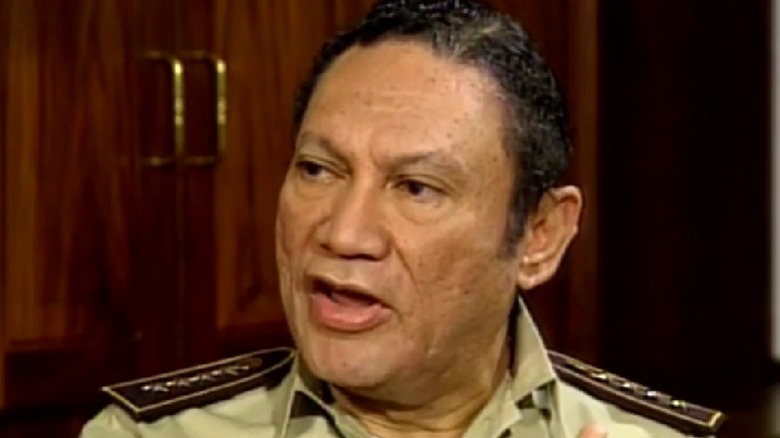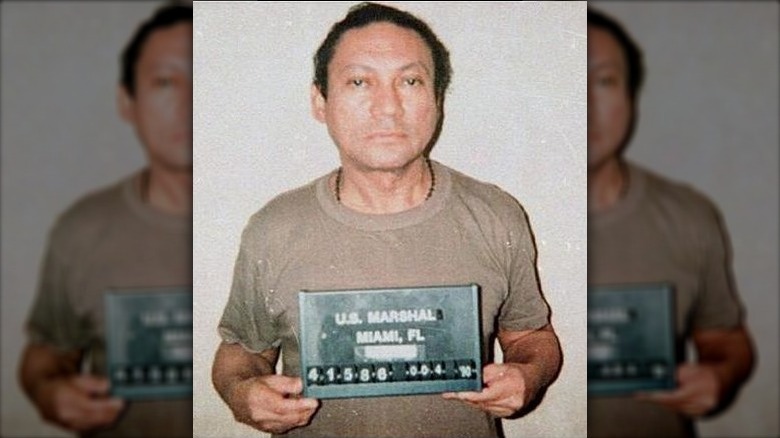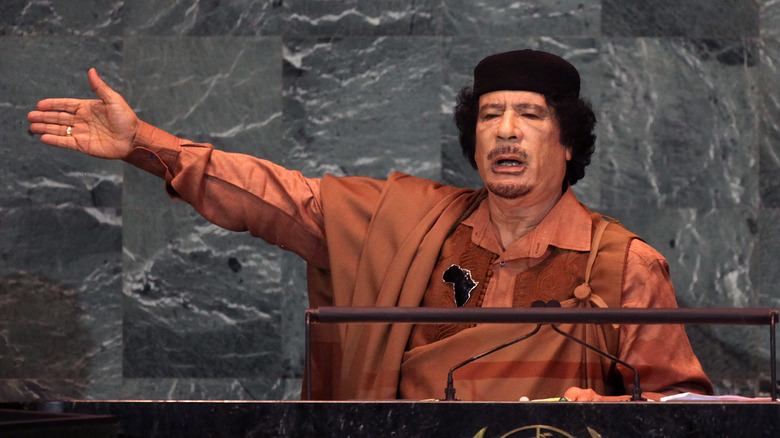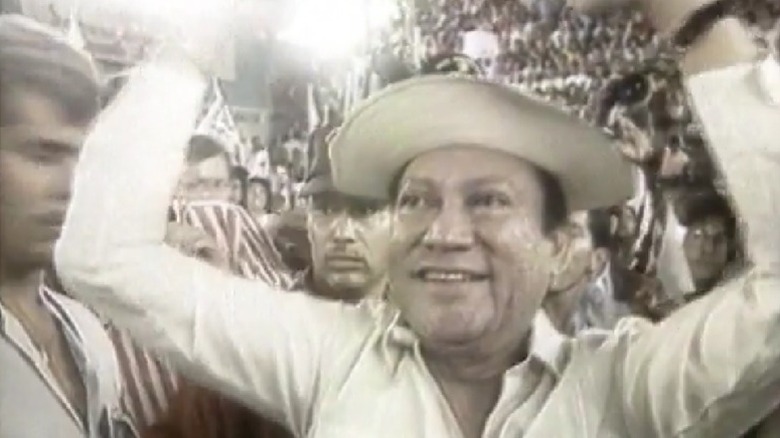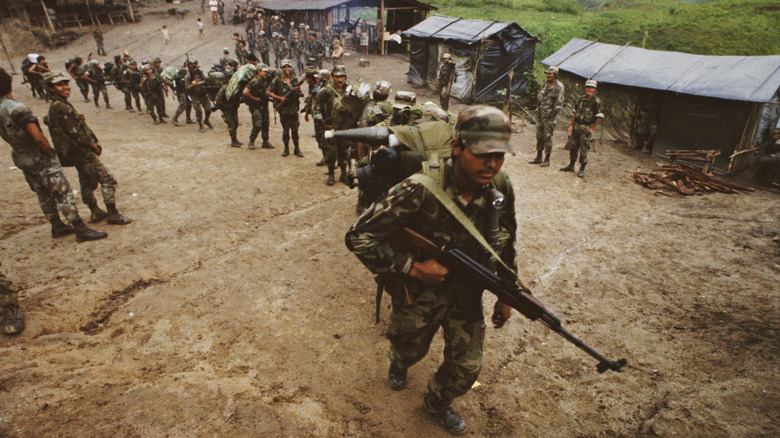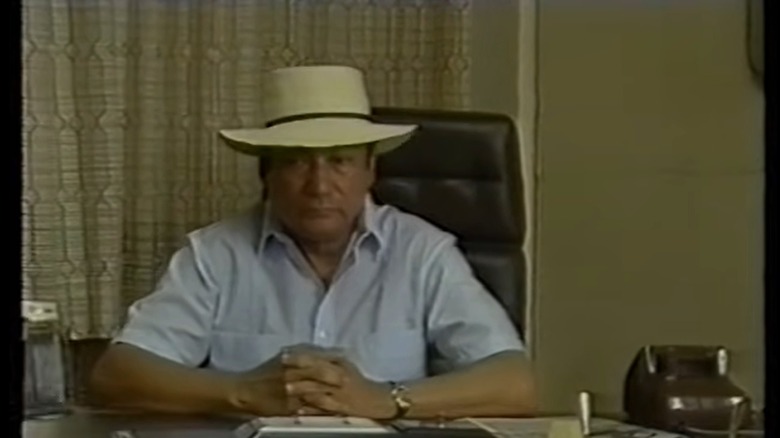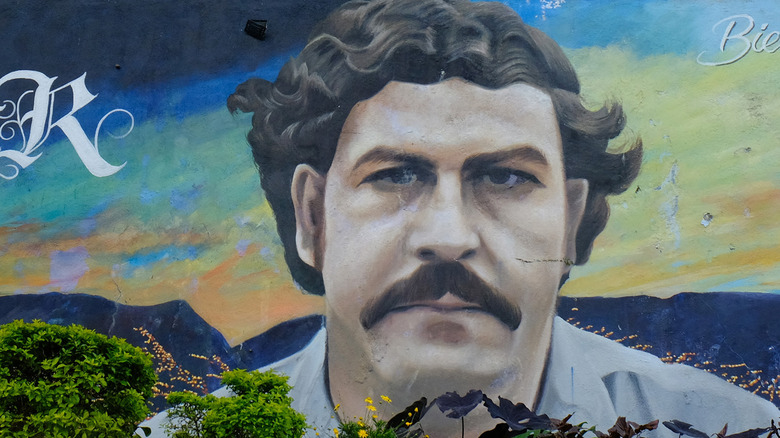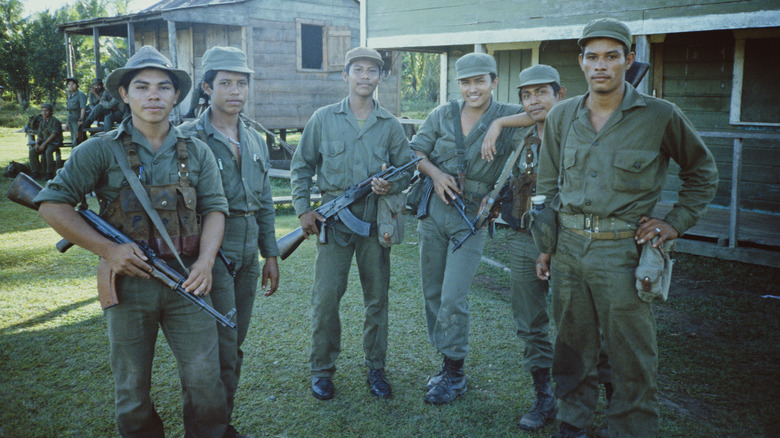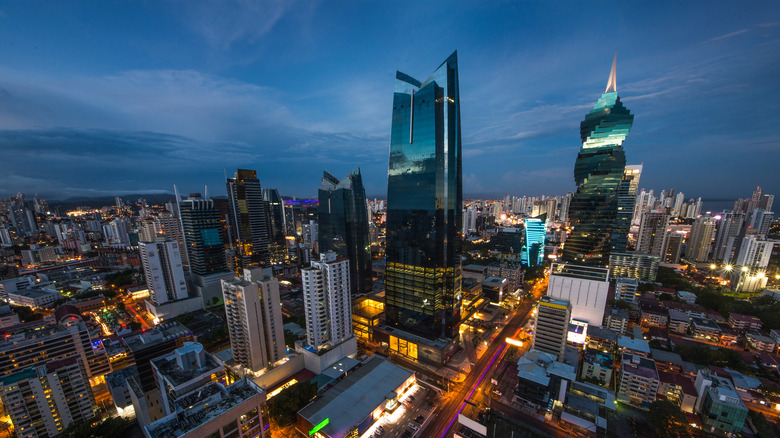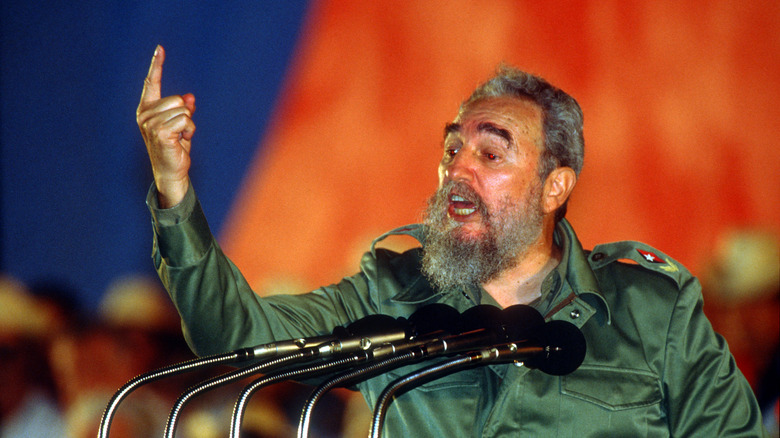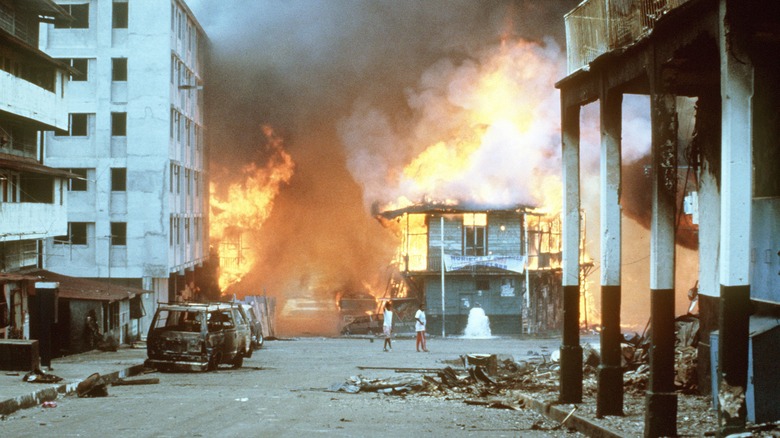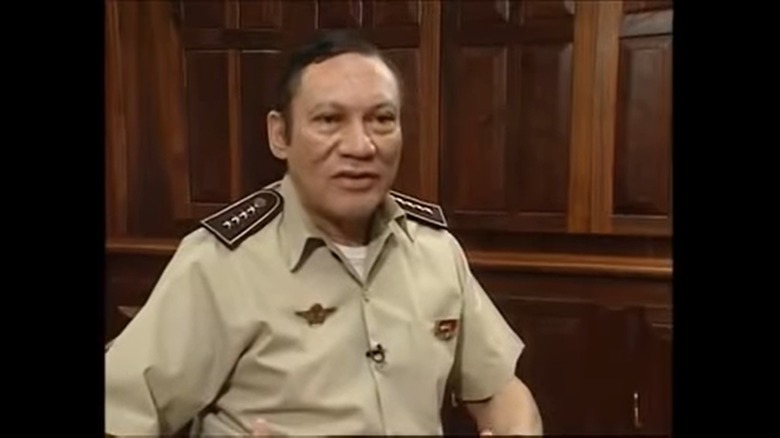Manuel Noriega: Messed Up Details About The Notorious Dictator
Manuel Noriega, the eccentric and sadistic dictator of Panama, was once in possession of a powerful political network that included an eclectic array of allies from Cuba to the United States to the Colombian drug cartels. A friend to everyone and to no one, he fell from power in a spectacularly dramatic fashion after provoking the enmity of the U.S.
Noriega came from a relatively humble background but rose to power by becoming indispensable to another Panamanian dictator, Omar Torrijos. Exercising his sharp intelligence and moral flexibility, he helped keep Torrijos in power throughout the 1970s. Noriega was a nightmarish figure long before he took over as dictator, with a history of rape, torture, and murder preceding him.
After Torrijos died in a plane crash in 1981, Noriega became the de facto ruler of Panama, installing a series of puppet presidents to do his bidding. The state he created has often been referred to as a "narco-kleptocracy," designed to service drug dealers and those looking to launder money. Eventually, Noriega's crimes could no longer be ignored — after becoming increasingly repressive at home and aggressive toward the U.S., American soldiers arrived to remove him during a full-blown invasion in 1989.
Here are just some of the messed-up details about the notorious dictator Manuel Noriega.
Manuel Noriega was frequently in trouble for sex crimes
Before becoming the dictator of Panama, Manuel Noriega was already an unpredictable and violent young man. Details about Noriega's childhood are hazy, but it is certain that he did not have the best start in life; he grew up in the slums of Terraplén in Panama City, raised by his godmother — what exactly became of his parents is unclear.
Desperate to escape a life of poverty, Noriega tried and failed to get into medical school before joining the National Guard. He did a stint at the Peruvian military academy before rising through the ranks of the service. While in the Guard he would abuse his position time and time again. Already, in 1963, he had been accused of raping a sex worker in his patrol car. A few years later he raped a teenage girl and got caught. The scandal got him reassigned to a remote region, but he was never punished beyond that. In general, he became known as a terrible drunk, at one point spending 30 days in confinement for his loutish behavior.
Despite his bad reputation, his time in the National Guard would be the making of him. While there he developed a strong working relationship with his superior — Panama's future dictator, Omar Torrijos. Torrijos was forced to discipline the young man, but he also recognized his talents as an amoral sadist. In the years to come Noriega would direct his violent impulses toward Torrijos' enemies as a loyal member of the new regime.
He was a creepy eccentric who loved Muammar Gaddafi and Genghis Khan
Manuel Noriega would grow up to become a classicly eccentric dictator, whose strange mix of childishness and brutality made for an unsettling personality. The Los Angeles Times highlighted that when American troops broke into his home following the dictator's fall, they found an odd mixture of teddy bears, barbie dolls, and model frogs, accompanied by pictures of sociopathic authoritarians, such as Adolf Hitler and Napoleon. Noriega's obsession with volatile strongmen is well-known — not least because he included a veritable love letter to Mongol warlord Genghis Khan in a treatise he wrote about the benefits of psychological warfare. Muammar Kadafi was another one of his idols; his home was plastered with images of the North African despot.
Apart from toys, Noriega also had an odd fascination with religion, accruing ephemera from multiple faiths, perhaps in an attempt to hedge his bets. His house contained a Christian shrine — although he was supposedly a Buddhist — and he took an interest in magic, voodoo, and protective talismans. The deeply superstitious dictator kept a personal sorcerer on hand for magical assistance. Noriega's own writings suggest that his interest in faith also went beyond the purely cultural — he regarded religion as an age-old form of psychological control, a topic that fascinated him throughout his life.
He unleashed a reign of terror as head of the security services
Before rising to become dictator of Panama, Manuel Noriega was the brutal iron hand beneath dictator Omar Torrijos' velvet glove. Following Torrijos' military coup, Noriega helped crack down on any resistance with death and torture. Receiving rapid promotion, throughout the '70s Noriega was made the head of the G2 intelligence services in Panama. Under his guidance, all political opposition was silenced, and dissenting men and women were thrown in jail en masse.
Most of Noriega's activities were conducted in the shadows, but some of his worst crimes have become public knowledge — the most notorious being the murder of a Roman Catholic priest, Father Hector Gallegos. The priest's work in Panama organizing agricultural cooperatives was seen as a threat by the regime, so the unfortunate father had to be removed. Gallegos vanished without a trace; however, according to R.M. Koster in his "In the Time of Tyrants," a member of Panama's National Guard later claimed that Noriega's thugs had beaten the priest bloody and cracked his skull in the process. They threw his body from a helicopter when it became apparent he would not recover from the savage beating.
A less well-known story, also reported by R.M. Koster in his "In the Time of Tyrants," alleges that while he was security head, Noriega once electrocuted a boy himself, simply for scrawling anti-authoritarian graffiti on a wall.
Despite his reputation, Manuel Noriega worked for the CIA
For Manuel Noriega, rape and murder were no barriers to achieving gainful employment with the United States government. While in military training in Peru, Noriega was recruited by the CIA, and his working relationship with American intelligence agencies would last for many years. By the time Noriega had become the dictator of Panama, he was still receiving payments from the CIA of around $200,000 a year.
In general, Noriega was part of the American effort to undermine leftist activity in the Americas. In his early days, he informed on the United Fruit Company workers and their unionizing activities, and later he offered to help the U.S. during the Iran-Contra scandal that unraveled under Ronald Reagan. At the time, Noriega agreed to provide training to anti-communist Contra fighters who were active in Nicaragua.
Unfortunately, America's deal with the devil also had some pretty outrageous consequences. During the Contra affair, Noriega helped ship weapons between the U.S. and Central America. At the same time, he packed the planes headed back to Texas with piles of cocaine as part of a drug-smuggling operation.
His regime tortured and sexually abused prisoners
Under Manuel Noriega, Panama became a hotbed of human rights abuse. Security service personnel dished out grotesque punishments with abandon, using torture and sexual humiliation against those who defied the authorities.
Noriega began using sexual humiliation as a standard punishment when he was head of the security services, and he would continue to use these methods as the country's de facto ruler. For example, according to Frederick Kempe in his "Divorcing the Dictator," eyewitnesses have claimed that on a least one occasion, some of Omar Trojillo's political opponents were raped with coke bottles and a splintered stick under Noriega's supervision.
When Noriega took power, the country increasingly came under the control of the army, which used violence to intimidate Noriega's opponents but shied away from killing where possible to prevent an international outcry. Outspoken Panamanians often had their houses robbed, and prisoners were regularly threatened with assault. According to R.M. Koster's "Life in the Time of Tyrants," following a brutal political crackdown in 1987 scores of men and women were sexually assaulted while in prison, and some of them were told they would be infected with AIDs by their attackers at the same time.
He was heavily involved in drug trafficking via Colombia
In addition to international espionage, Manuel Noriega made a great deal of money from the Latin American cocaine trade. Making an agreement with legendary Colombian narco, Pablo Escobar, Noriega allowed the Colombians to use Panamanian airstrips to move goods abroad. R.M. Koster writes in his "Life in the Time of Tyrants," that Noriega received up to $500,000 per flight (as well as little cocaine for himself) in exchange for his assistance. On one occasion, according to The Washington Post covering Noriega's 1991 trial, Escobar also once offered Noriega six French prostitutes as a deal-sweetener. Noriega's planes took the cocaine deliveries from Panama through Texas throughout the 1980s, part of an efficient supply chain that stayed under the DEA's radar for many years.
Although the U.S. was aware that Noriega had some role in the drug trade for quite some time, they looked the other way while he was a useful ally. Eventually though, as Noriega became more authoritarian in the mid-1980s, his drug smuggling became increasingly unacceptable to the American authorities. Noriega was indicted on cocaine-trafficking charges in 1988, a year before he fell from power.
Manuel Noriega murdered his political opponent, Hugo Spadafora
Although Manuel Noriega had a host of crimes to his name, it was the brutal torture and killing of one of his political opponents in 1985 that really garnered international attention. Dr. Hugo Spadafora, a dashing doctor-turned-revolutionary from Panama, was an outspoken critic of Noriega's rule, but he disappeared in nearby Costa Rica. His body was later found in a ravine, his head missing.
Spadafora was well known in Panama having made a name for himself fighting with guerrillas in Africa and the leftist Sandinistas in Nicaragua. Shortly before he was killed, he made the brave but reckless decision to discuss Noriega's laundry list of drug trafficking crimes with U.S. officials in Costa Rica.
Upon returning from abroad he was seen being taken into custody by the Panamanian soldiers. Spadafora was removed from a bus at the border, after which — he vanished. The autopsy on his body revealed that he had been severely beaten and sexually tortured before having his head sawn off. Although he denied any involvement, the death of Spadafora sparked major protests from Noriega's opposition. The government refused to launch an investigation into the killing, and President Nicolas Ardito Barletta was fired after suggesting an inquiry should take place.
He made Panama one of the money-laundering capitals of the world
When Manuel Noriega ran Panama, the country increasingly offered money-laundering services to anybody who needed them — most especially Colombian drug dealers. Panama's status as a hub for dirty money has outlived the dictator himself and is still a problem today, exposed most recently by the Panama Papers.
John Dinges, in his book "Our Man in Panama," records that Noriega's drug-smuggling operation with the Colombian cartels eventually expanded to include cleaning dirty money as well. To facilitate these cleaning trips, Pablo Escobar bought a special plane for use in the operation. The jet was fitted with false compartments in the nose, designed for hiding tons of cash.
Panama's Bank of Credit and Commerce International (the BCCI) in particular gradually became an infamous money laundering outfit for narcos, but many other Panamanian banks were involved as well. Panama has historically allowed an unusually high level of secrecy in its banking system, and the origins of dirty money are usually never investigated. Under Noriega, suspicious boxes of money regularly showed up at airports in Panama, waiting to be cleaned, no questions asked. Groups like M-19, the pro-Cuban guerrillas who terrorized Latin America in the 1980s, chose Panama to launder their money during the Noriega regime.
He double-crossed everyone he worked with
While running Panama, Manuel Noriega moonlighted as an intelligence operative, working with both the U.S. and Fidel Castro, in a dangerous game that would eventually lose him the love of the American government.
Noriega spied on Castro for years and he provided the U.S. with valuable intelligence that supported American action against the Communist Contras; however, he actually had no scruples about supporting politicians on both sides of the political spectrum. According to R.M. Koster's "Life In the Time of Tyrants," Noriega's regime eventually began selling Panamanian passports to anybody who wanted them — including Cuban spies.
Noriega's double-dealing did not go unnoticed forever, and during the mid-'80s the U.S. government started to bristle at the dictator's various side gigs. A New York Times article, printed in 1986, reported that Noriega had invested in firms selling American tech secrets to enemies of the U.S. It went on to state that Noriega had been actively supporting "M-19," a pro-Cuban rebel group by supplying the guerrillas with weapons. Noriega's willingness to work with anyone and everyone who paid him would eventually contribute to his downfall.
Manuel Noriega's men shot an unarmed American soldier sparking a war with the US
Manuel Noriega's authoritarianism, drug trafficking, and secret selling gradually eroded his relationship with the U.S. In 1986, the U.S. demanded his removal from Panama, and in 1988, he was indicted for drug trafficking and money laundering by the American courts.
Rather than trying to make amends, Noriega foolishly became openly anti-American, publicly launching into anti-American tirades while brandishing a machete. In 1989, the Panamanian National Assembly declared war on the U.S. in an act of suicidal hubris. However, America did not react until December of that year, when an unarmed American soldier was shot by Panamanian forces. Keen to avenge the killing, and eager to remove an unstable maniac from the vicinity of the strategically invaluable Panama Canal Zone, America went to war.
The invasion that followed proved to be extraordinarily brief. Noriega's forces were no match for American arms, and the dictator himself immediately hid and ran, sealing himself away in the Vatican embassy in Panama City. In one of the most bizarre maneuvers in history, U.S. Gen. Maxwell Thurman surrounded the building with loudspeakers and smoked him out with a playlist of classic rock anthems. Using the combined power of Guns N' Roses, Billy Idol, and Black Sabbath — music Noriega purportedly hated — the Americans forced the dictator to give up after less than two weeks of hiding. He was subsequently flown to Florida to face criminal charges.
Despite his horrific crimes he was given special treatment in prison
Following the U.S. invasion of Panama, Manuel Noriega was flown to Miami, Florida, and formally charged. In 1992, he was convicted for some of his crimes, including drug trafficking, racketeering, and money laundering. In what may be seen by some as a miscarriage of justice, Noriega was treated with great civility and kindness while in jail in the U.S.
Although initially sentenced to 40 years in prison, Noriega's term was reduced to 30 years, and he was released after serving just over half his sentence — free after just 17 on the grounds of good behavior. Noriega had been declared a prisoner of war, which allowed him special privileges other prisoners do not get. Rather than paying for his stint in prison, for example, he was awarded a small salary and given a telephone.
Thankfully after his release, other major powers were out for Noriega's blood. He was extradited to France, where he had used money laundering profits to acquire French property. While in jail in France, he was tried in absentia in Panama, so upon his release — he was jailed yet again. He died in prison in Panama while serving three 20-year terms for murdering his political opponents.
